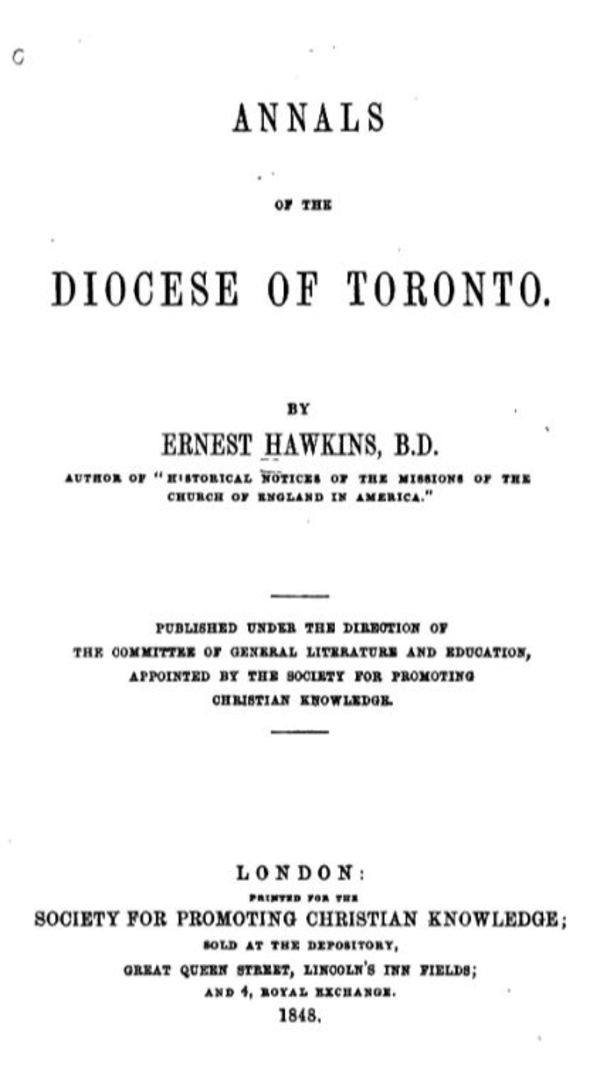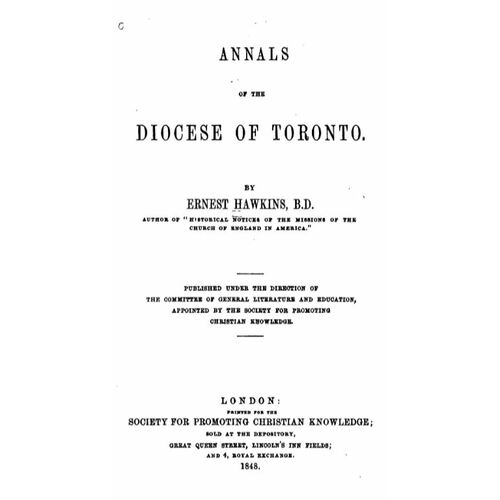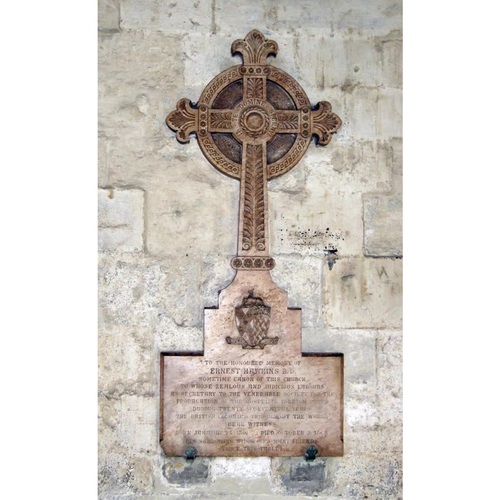
Source: Link
HAWKINS, ERNEST, Church of England clergyman and secretary of the Society for the Propagation of the Gospel in Foreign Parts; b. 25 Jan. 1802 at Hitchin, Hertfordshire, England, the son of Henry Hawkins and Anne Gurney; m. in 1852 Sophia Anna Lefroy; d. 5 Oct. 1868 in London, England.
Ernest Hawkins attended Balliol College, Oxford, and received from the university his ba in 1824, his ma in 1827, and his bd in 1839. After ordination he became a fellow of Exeter College, Oxford, and also served as under-librarian of the Bodleian Library. In 1844 he was made a prebendary of St Paul’s Cathedral, London, and in 1850 he succeeded Francis Fulford, bishop designate of Montreal, as minister of Curzon Chapel in London. In 1838 he had been appointed assistant secretary, and in 1843 secretary, of the Society for the Propagation of the Gospel, the Church of England missionary organization. After a successful career in this post, he resigned in 1864 on his nomination as canon of Westminster.
During his 26-year service with the SPG, Hawkins bore heavy responsibility for the welfare of hundreds of Anglican clergymen and their families in British North America and throughout the world. In 1838, for example, the SPG supplied £12,254 to 99 missionaries in the dioceses of Quebec and Nova Scotia. Thirty-eight missionaries in Upper Canada were being paid from clergy reserves income and 28 in Nova Scotia received salaries from the British parliament. In 1864, with the addition of the North West Territories and British Columbia, there were 234 Anglican missionaries in British North America. Through his personal acquaintance with the missionaries of the society, many of them sent from England, and from his knowledge of their work through regular correspondence, he gained an extensive understanding of the church’s life. Moreover, from its formation in 1841 until 1864 he was honorary secretary of the Colonial Bishoprics Council, an organization for the extension of the colonial episcopate. In this capacity he was involved in setting up new dioceses and appointing bishops to them: John Medley* to Fredericton in 1845 and Francis Fulford to Montreal in 1850. He was also concerned with the formation of the dioceses of Huron in 1857 and Ontario in 1861, to which respectively Benjamin Cronyn* and J. T. Lewis* were elected by the Canadian laity and clergy. Relations between the SPG and the bishops in British North America were generally cordial, though some, like Cronyn, objected to what they saw as the society’s high churchmanship.
In 1849 Hawkins paid a private visit to the eastern United States and British North America. In the course of the tour he kept a journal, an incisively written document which, supplemented by letters to English correspondents, gives an absorbing account of places visited, persons met, and travelling conditions. Apart from a desire to see SPG missions at first hand, Hawkins was also concerned with establishment of a new policy of the society towards them. Many parishes themselves provided a house and church and a small stipend to the missionary, but the SPG salary of £100 and £125 was still highly valued by many clergy because of its regularity. Hawkins felt nevertheless that certain missions could become self-supporting. Thus from the 1830s to the 1860s the number of SPG supported missionaries increased, while the aid required by them decreased. Missions in Upper Canada, for example, after 1832 were receiving income from the sale of clergy reserve lands, and, in certain cases after 1836, from endowments granted by Lieutenant Governor Sir John Colborne. Consequently, support for the diocese of Toronto ended in 1858, and the dioceses of Montreal, Huron, and Ontario finally became self-supporting in the early 1880s. The dioceses of Fredericton and Nova Scotia, however, continued to receive support into the first decade of the 20th century, the diocese of Quebec until 1900, and Newfoundland until 1922.
During his visit in 1849 Hawkins was careful to consult the bishops on matters of missionary policy, beginning with George Jehoshaphat Mountain at Quebec. The two men discussed with Governor General Lord Elgin [Bruce] the establishment of the new diocese of Montreal. Elgin asked Hawkins to be the first bishop of the projected diocese, but he refused the offer. From Montreal Hawkins proceeded to Kingston, where on 19 August he took part in a large service in which 136 persons were confirmed and 12 deacons and five priests ordained by Bishop John Strachan. In Toronto he was hospitably entertained by Strachan, whom he much respected. Hawkins in London frequently sought support among British politicians for measures concerning education and the clergy reserves which Strachan and the Anglican church in Canada desired. Writing about his visit, Hawkins observed: “We went over again the perennial question of the Clergy Reserves – his Lordship lays down his arms and surrenders.” Two years later Hawkins assisted Strachan in founding Trinity College by donating £2,000 in SPG funds and seven and one half acres of valuable land. He also encouraged Strachan to call a synod with lay representation in order to strengthen the Canadian church which, with the achievement of responsible government in Canada, could no longer rely on friends in London to protect its interests.
Hawkins went next to Niagara Falls, which greatly impressed him, journeyed to Detroit and Sarnia, then turned east again to Toronto, Kingston, and Montreal, visiting several SPG missions on the way. He went to Bytown (Ottawa) and afterwards took a tour through the Eastern Townships, spending a short time at Bishop’s College, Lennoxville. From Quebec he proceeded to Rivière-du-Loup; he thought the SPG’s yearly donation of £100 there could be better used elsewhere, since “next to nothing is doing at this place.” At Fredericton he stayed for a week with Bishop John Medley, who that same year stated there would be only “12 missions out of 40 which would support a Clergyman in common decency” if the society abandoned its aid to his diocese. A call at Saint John was followed by a short visit to Bishop John Inglis* near Windsor, Nova Scotia. Hawkins then returned to England. He visited Toronto again in 1853.
During his years with the SPG Hawkins edited a number of small publications with the general title The church in the colonies. Several of these tell in great detail about the journeys of Bishop Edward Feild* of Newfoundland with whom Hawkins was on intimate terms. Others relate the travels of bishops Inglis, Medley, Mountain, and Strachan. All are of great historical interest. Hawkins also edited the series Missions to the heathen; two of its numbers dealt with F. A. O’Meara*’s Indian missions on Lake Huron. He directed the publication in 1844 of the Colonial church atlas which included maps of Canadian dioceses. He also wrote histories of the dioceses of Quebec, Toronto, and Fredericton. A number of other historical, biblical, and devotional works came from his pen.
The quarter century during which Hawkins served the SPG was a period of unprecedented expansion. Voluntary subscriptions rose from £16,557 in 1838 to £91,703 in 1864, and the number of overseas dioceses increased from 8 to 47. In both 1838 and 1863 the SPG spent approximately one-third of its income on British North American missions. After Hawkins’ death a writer in the London Guardian eulogized him for his tact, judgement, breadth of mind, and absence of party feeling, and concluded: “He was one of those men who do unseen much of the real work of life.” A recent historian of the SPG writes of him as perhaps the greatest secretary that the society has ever had; certainly no English churchman made a greater impact on Anglican development in eastern Canada from 1838 to 1864.
Ernest Hawkins was the author of Annals of the diocese of Fredericton (London, 1847), Annals of the diocese of Toronto (London, 1848), Annals of the diocese of Quebec (London, 1849), Historical notices of the Church of England in the North American colonies previous to the independence of the United States . . . (London, 1845), and editor of Documents relative to the erection and endowment of additional bishoprics in the colonies; with a short historical preface (London, 1844). USPG, Hawkins papers. Church, 1, 15 Sept. 1853. Guardian (London), 7, 14 Oct. 1868. Soc. for the Propagation of the Gospel in Foreign Parts, Report (London), 1869. DNB. W. F. France, The oversea episcopate; centenary history of the Colonial Bishoprics Fund, 1841–1941 (Westminster, Eng., [1941?]). H. P. Thompson, Into all lands; the history of the Society for the Propagation of the Gospel in Foreign Parts, 1701–1950 (London, 1951), 111, 154.
Cite This Article
T. R. Millman and J. L. H. Henderson, “HAWKINS, ERNEST,” in Dictionary of Canadian Biography, vol. 9, University of Toronto/Université Laval, 2003–, accessed December 28, 2025, https://www.biographi.ca/en/bio/hawkins_ernest_9E.html.
The citation above shows the format for footnotes and endnotes according to the Chicago manual of style (16th edition). Information to be used in other citation formats:
| Permalink: | https://www.biographi.ca/en/bio/hawkins_ernest_9E.html |
| Author of Article: | T. R. Millman and J. L. H. Henderson |
| Title of Article: | HAWKINS, ERNEST |
| Publication Name: | Dictionary of Canadian Biography, vol. 9 |
| Publisher: | University of Toronto/Université Laval |
| Year of publication: | 1976 |
| Year of revision: | 1976 |
| Access Date: | December 28, 2025 |




